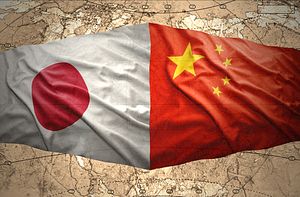As Clint reported earlier today, Shinzo Abe’s LDP has succeeded in reaching an agreement with New Komeito to lift the ban on Japan’s ability to engage in collective self-defense. China has been vocal in opposing any moves that give Tokyo more freedom to build up and make use of military force. Surprisingly, then, the response was fairly muted. It focused not on how Abe’s collective self-defense policy will affect China, but how it will affect Japan itself.
Foreign Ministry spokesperson Hong Lei expressed China’s concern over the move. With Japan “stirring up troubles on historical issues” while also loosening restrictions on its security forces, Hong said, “People cannot [help] but question whether Japan is deviating from the path of peaceful development that it has been upholding since the end of WWII.” Hong also warned that Japan “must not undermine China’s sovereignty and security interests.”
However, much of China’s focus after the announcement was on Japanese domestic opposition to the move. Hong noted in his press conference that “there are strong objections in Japan to the lifting of the ban on the collective self-defense right.” He added, “It is the general public of Japan that should have the final say” on Japan’s future.
Chinese media reports on the decision further emphasized opposition to collective self-defense within Japan. One Xinhua news analysis called the approval of the Cabinet resolution “not a convincing choice made by the Japanese people, but [one made] only by Abe and his ruling bloc.” The article cited poll results that say over half of Japanese are opposed to authorizing collective self-defense, as well as highlighting major protests against the move, including a self-immolation in Tokyo. A piece in China Daily had a similar focus on public opposition to the decision.
In addition to looking at public dissent, Chinese media chastised Abe for achieving his end not through an official amendment to the constitution, but through a unilateral reinterpretation of it. Many articles warned that Abe’s tactics posed a major threat not only to regional security but also to Japan’s constitutionalism and rule of law.
One Xinhua article called the embrace of collective self-defense “a blatant betrayal of the pacifism enshrined in Japan’s constitution” and noted that “the Japanese general public is clear-eyed and alarmed.” Still, the commentary said, Abe “has chosen to turn a deaf ear to the voices of the people” and use a “treacherous trick” to relax the limits on collective self-defense. The article calls on “the Japanese people and the international community” to prevent Abe “from further befouling Japan’s national ethos.” Yet another piece in Xinhua interviewed political and security analysts who argued that Abe has used fear-mongering (the “China threat”) to trick the public into accepting his drastic changes to Japan’s defense forces. But now, the article said Japan’s people are beginning to wise up to Abe’s tricks.
The response to Japan’s relaxation of the ban on collective self-defense reflects the more nuanced Japan policy Beijing has adopted in recent months. Shinzo Abe has always faced personal criticisms from China, but lately the Chines government has been even more careful to draw a distinction between Abe on the one hand and “Japan” on the other. According to this formulation, Chinese officials can compartmentalize their criticisms of Japan’s “war-mongering” and “white-washing history.”
As I wrote back in April, this is part of a larger trend wherein China rewards officials seen as pro-China with visits and friendly rhetoric. This allows Beijing to continue its diplomatic snubbing of Abe’s government while maintaining a baseline of relations with Japan as a whole. It also allows for a more complex diplomatic response, leaving China an out for establishing positive relations with Japan once Abe’s term as prime minister comes to an end.
China’s media response to the decision on collective self-defense fits snugly into this pattern. Media reports were surprisingly quiet on the negative ramifications the move would have for China. Instead, they portrayed the new interpretation of Japan’s constitution as a blow to Japan’s moderate forces, which constitute the majority of the population. Seen through this lens, Abe is not just China’s enemy, but an enemy to Japan itself.
China’s most recent Japan strategy, then, resembles a “good cop, bad cop” routine. On one hand, China will show fierce opposition towards the Shinzo Abe administration, attacking it as a trouble-maker in the region. But, on the other hand, China wants to demonstrate its willingness to work with Japanese politicians and businesses that are seen as China-friendly. Increasingly, China seems willing to offer this special treatment toward anyone who opposes Shinzo Abe — especially Japanese pacifists and constitutionalists who oppose reinterpreting the restrictions on Japan’s use of military force. In a sense, China is trying to go over Abe’s head by appealing directly the the majority of Japanese people. This is a tough sell, considering that recent polls show over 90 percent of Japanese have a negative impression of China, but that apparently won’t stop Beijing from trying.

































